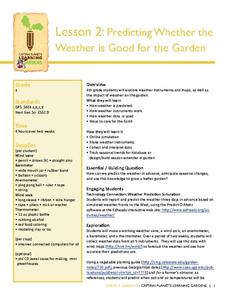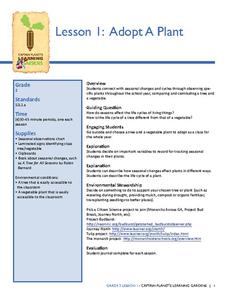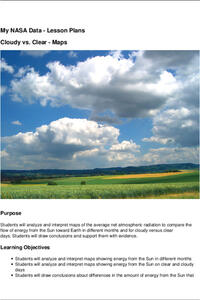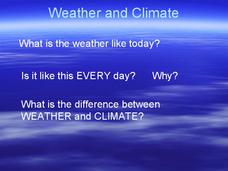Space Awareness
The Intertropical Convergence Zone
Young scientists know it is hotter along the equator, but why is it also rainier? Through the process of completing two experiments and a worksheet, scholars discover the answer is the intertropical convergence zone. First, they...
Worchester Polytechnic Institute
Interactive Laboratory Activities for Secondary Education
Do you think the lab smells like rotten eggs? Sorry to hear about your sulfering. A set of five experiments covers many different topics including seasons, gravity, food, precipitation, and photosynthesis. Though not presented as a...
Core Knowledge Foundation
Seasons and Weather: Supplemental Guide
From warm summer days to cold winter nights, this 10-lesson unit takes children on an exploration of seasons. Using the included reading passages and images, a series of read-aloud lessons and vocabulary activities...
Core Knowledge Foundation
Seasons and Weather: Read-Aloud Anthology
Kindergartners explore the cycle of the seasons in a 10-lesson language arts unit. Through a series of picture-supported read-aloud activities, children are able to identify the sequence of seasons and the types of weather...
NASA
The Science of the Sun
There's more to that glowing ball of light in sky than most children realize. From the overall structure of the solar system, to the changing of the seasons, these hands-on lessons open the eyes of young scientists to...
Captain Planet Foundation
Predicting Whether the Weather is Good for the Garden
Can your class predict the weather? Show them how they can come close with a instructional activity about creating weather instruments, including weather vanes, barometers, wind socks, anemometers, and thermometers. Kids research weather...
Captain Planet Foundation
Adopt-A-Plant
Note the way that plants change during the season by adopting a plant on your school campus. After your class chooses their plant, they research the plant's needs, how it differs from other plants, find ways to support their plant's...
Texas Instruments
Sands of Time
Twelfth graders explore an application of integration. A calculus lesson prompts class members to find the length of the day where they live during the winter and summer solstice. Using data relating to the solstices at...
NASA
Cloudy vs. Clear - Maps
Find out the science of how clouds keep Earth cooler on hot days. Using guided discussions, investigators analyze and interpret maps of how much solar energy Earth receives at different times of the year. Participants draw conclusions...
PBS
Season Seeking
It's a time of change. A hands-on activity engages young scientists in a lesson highlighting the change of seasons. They brainstorm indicators of season changes in nature and then look for them. Next, they record observations in a field...
National Wildlife Federation
Summer Midnight Sun
Sunlight hours and climate have a clear connection. Young researchers collect data about the sunrise and sunset times in an Arctic climate as well as the average temperatures. They then graph their data to make connections between the...
Minnesota Department of Natural Resoures
Tree Life
The life of a tree is the focus of a packet consisting of several activities all covering a different subject. Second graders measure shadows, make pinecone critters, write poems, count rings, complete a word search, play tree tag, and...
Minnesota Department of Natural Resoures
Getting to Know Trees
Celebrate the beauty of trees with a packet full of activities designed to help kindergarteners get to know about their leafy nature friends. Covering a variety of subjects, scholars go on a nature hike, read Shel Silverstein's The...
Radford University
Trouble in the Orchard
It's no fun catching a fungus. Scholars first investigate how the seasons affect the angle of the sun and the lengths of shadows. They then apply right triangle trigonometry to determine the height of trees based on their shadows to...
Space Awareness
Seasons Around the World
Why does Earth experience summer, fall, winter, and spring? Using an informative demonstration, learners see how the angle of the sun on Earth and the rotation of Earth determine the seasons. Scholars work in pairs to learn that the...
North American Montessori Center
Sun and Moon Autumnal Equinox Activities
Two hands-on activities celebrate the sun and moon autumnal equinox. First, scholars create a cairn using a shoebox, flashlight, and drawing tools to view the sun's progression. Second, learners take to the kitchen to bake mooncakes...
CK-12 Foundation
Seasonal Changes in Plants: Leaf Pigment
Leaves fall off the tree in the autumn, but why do they change colors? The interactive covers the role of chlorophyll and photosynthesis. It also explains both carotenoids and anthocyanins.
CK-12 Foundation
Natural Selection: Of Seasons and Species
Do predators look for different things in different seasons? The quick interactive shows how some species survive longer in one season than another based on the conditions. The challenge questions encourage pupils to demonstrate that...
Space Awareness
Climate Zones
The climate at the equator is hotter than the climate at the poles, but why? The instructional activity goes in depth, explaining how the angles of illumination relate to the heating rate at different latitudes and seasons. Scholars use...
Curated OER
Weather and Climate
It's hot today, but is that the weather or the climate? This colorful presentation isolates both concepts to allow for better understanding by covering the positioning of the planet, making comparisons of land versus water, and looking...
Chicago Botanic Garden
Seasons of a Plant
The third in a series of six lessons is an engaging three-part activity defines that discusses phenology, focusing on the cyclic seasons of plants. Pupils then observe phenology outside before determining how climate change can...
Chicago Botanic Garden
Preparing for Project BudBurst
Male deer growing antlers to begin the breeding season is an example of a phenological event. First in a four-part series is an activity requiring individuals to collect phenological data on their campus. Classes discuss phenology, the...
Can Teach
Groundhog Day Songs and Poems
This Groundhog Day add a bit of rhythm and rhyme with 23 songs and poems that put a spotlight on the holiday's shining star, the groundhog.
S2tem Centers SC
Seasons
Winter, spring, summer, and fall—take the learning of the seasons beyond the elementary level to the middle school classroom. Curious learners begin by watching videos about the seasons and the rotation of planet Earth. Then,...

























